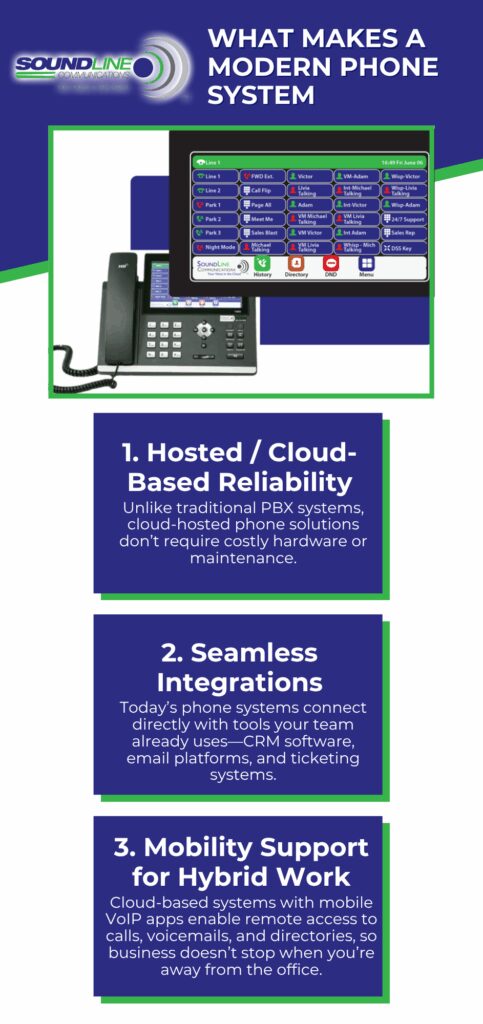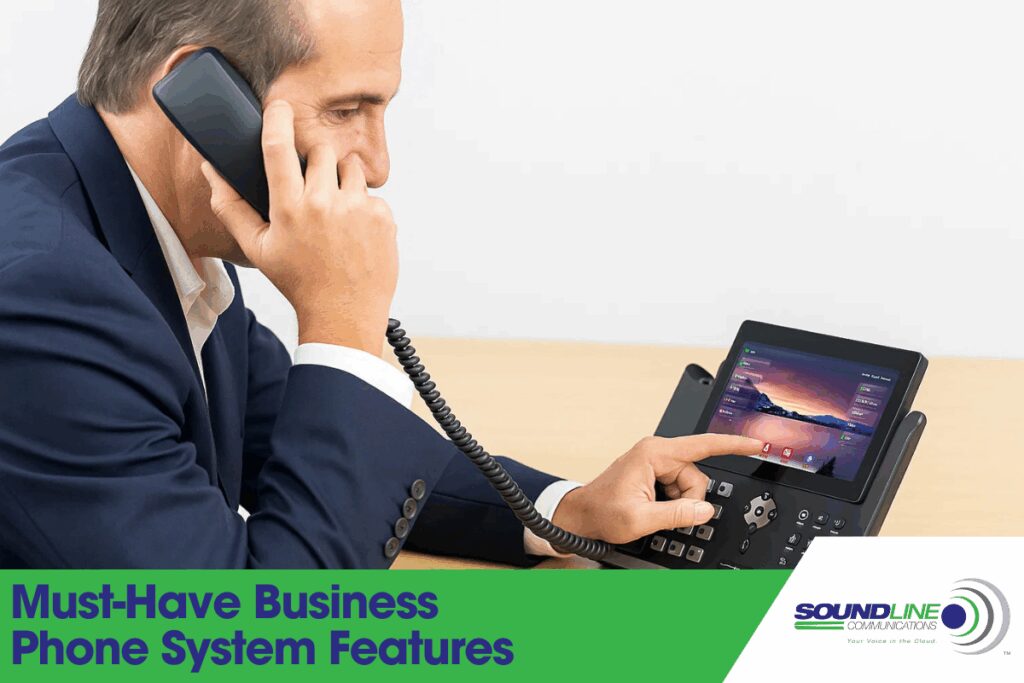The way businesses communicate has undergone a significant transformation. Phone systems now serve as the hub of daily operations, from hybrid workplaces to fully remote teams. A modern business phone system must go beyond making and receiving calls. It should connect your team, enhance customer experiences, and support flexibility across offices and devices.
The right system can make the difference between missed opportunities and seamless collaboration for office managers, IT coordinators, and operations leads.
In this guide, we’ll explore the top business phone system features that matter most today, their impact on performance, and what to look for when comparing systems.
Why Phone System Features Matter More Than Ever
Businesses rely on instant communication to stay competitive. Whether it’s managing customer calls, routing inquiries efficiently, or supporting remote employees, your phone system’s capabilities directly affect how your business performs.
Modern workplaces demand solutions that:
- Support employees across locations
- Provide reliable uptime and call quality.
- Integrate with tools such as CRM systems or email platforms.
- Deliver insights into performance and customer experience.
If your phone setup isn’t meeting these needs, it’s time to explore an upgrade to a cloud-based VoIP system that offers scalable, feature-rich communication.
Learn more about the advantages of modern VoIP systems in What is VoIP and How Does It Work for Business.
Overview: What Makes a Modern Phone System
Modern business phone systems are defined by three key qualities: cloud-based flexibility, integration capability, and mobility support.
1. Hosted / Cloud-Based Reliability
Unlike traditional PBX systems, cloud-hosted phone solutions don’t require costly hardware or maintenance. Calls are routed securely through the internet, allowing your business to scale easily while minimizing downtime.
Soundline’s hosted PBX technology ensures uptime even during outages, keeping teams connected from anywhere.
2. Seamless Integrations
Today’s phone systems connect directly with tools your team already uses—CRM software, email platforms, and ticketing systems. Integration reduces double-entry and provides call data insights that drive better decisions.
3. Mobility Support for Hybrid Work
Employees expect to stay connected from anywhere. Cloud-based systems with mobile VoIP apps enable remote access to calls, voicemails, and directories, so business doesn’t stop when you’re away from the office.
Discover how Soundline supports mobility with Mobile VoIP for Agents on the Go.
Top 10 Business Phone System Features to Look For
When evaluating providers, focus on these ten key features that deliver the most value in terms of performance, reliability, and team collaboration.
1. Voicemail-to-Email
Voicemail-to-email converts voice messages into audio files or transcriptions, which are sent directly to your inbox. This saves time and ensures you never miss an important client message, even if you’re in a meeting or out of the office.
Scenario: An operations lead reviewing multiple departments can quickly scan voicemails during travel—no need to manually log into a phone system.

2. Call Forwarding & Routing
Smart call forwarding and routing ensure calls reach the right person or department without delay. It’s especially useful for distributed teams or businesses with multiple offices.
With Soundline’s customizable routing, you can design call flows that follow time zones, schedules, or specific employee roles.
Scenario: A customer calls your main office after hours, and the call automatically routes to an on-call technician’s mobile phone—no downtime, no missed opportunities.
3. Auto-Attendant / IVR
An interactive voice response (IVR) system greets callers, provides menu options, and efficiently routes them. This feature gives smaller businesses a professional edge and saves staff time.
Scenario: A dental office uses IVR to automatically route new patient inquiries to reception and billing questions to finance, ensuring faster responses and better client satisfaction.
4. Call Recording
Call recording is essential for training, compliance, and quality assurance. Managers can review recorded calls to improve communication scripts or confirm details discussed with clients.
Soundline’s secure recording feature helps maintain accountability across customer interactions.
Scenario: A customer service manager analyzes recorded support calls to identify training opportunities for new hires.
5. Call Queues & Ring Groups
Call queues keep callers informed during high-traffic periods, while ring groups ensure multiple team members can answer calls simultaneously. This combination improves responsiveness and the caller experience.
Scenario: During a product launch, your marketing hotline receives hundreds of calls daily. With ring groups, any available agent can pick up instantly—keeping your service consistent and professional.
6. Mobile Apps
Mobile apps are essential for remote work and field employees. They allow your team to make and receive business calls, access contacts, and manage voicemails directly from smartphones.
Soundline’s mobile platform ensures your team remains connected, whether they’re in the office or on-site with clients.
Scenario: A project manager uses the Soundline app to join conference calls while traveling between job sites.
7. CRM Integration
Integrating your phone system with a CRM enables automatic call logging, screen pops with client details, and better data visibility. It streamlines workflows and enhances customer experiences.
Scenario: A sales rep sees a client’s profile and purchase history before answering a call, personalizing every interaction.
Explore Soundline’s Smart CRM Integration for real-time customer insights.
8. Real-Time Dashboard
A live dashboard displays team activity, queue status, and performance metrics in one convenient location. Managers can make informed decisions quickly, balancing workloads and identifying call spikes in real-time.
Scenario: A support manager monitors live call data to reassign agents to busy departments during peak hours.
9. Call Analytics
Call analytics transform raw data into actionable insights. Businesses can track call volumes, wait times, and conversion rates to improve efficiency and ROI.
Scenario: A law firm reviews call analytics to determine which marketing campaigns generate the most new client inquiries.
10. Failover & Redundancy Settings
System redundancy ensures your phone network remains online, even during outages or maintenance. Failover routing automatically switches calls to backup lines or devices to maintain reliability.
Scenario: During a power outage, your system automatically reroutes calls to mobile devices—so clients still reach your team without interruption.
Why Features = Functionality
Each of these features adds measurable value to your operations. Collectively, they enhance communication efficiency, protect productivity, and strengthen customer trust.
- Save time: Automated routing and voicemail-to-email reduce manual call handling.
- Enhance customer experience: IVR and call queues create smoother interactions.
- Support growth: Cloud scalability ensures your phone system adapts as your business expands.
Read more about advanced system options in Top 10 Features to Look for in a Cloud Phone System.
Choosing the Right System
Selecting a business phone provider is more than just about features. You need a partner that understands your workflow and supports your growth.
1. Evaluate Your Needs
Consider how your team communicates internally and with customers. Identify must-have features versus nice-to-haves. For example, distributed teams might prioritize mobile apps and call analytics, while medical offices focus on call queues and compliance tools.
2. Ask the Right Questions
When comparing vendors, focus on these essentials:
- What’s included in the base plan?
- How are integrations supported?
- Is uptime guaranteed in writing?
- What type of customer support is available?
3. Get Team Buy-In
Before implementation, involve your staff in the decision process. Gather feedback on challenges and desired features. Teams that feel included are more likely to adopt the system fully and use it efficiently.
Conclusion
The right business phone system features can transform how your company communicates—saving time, boosting performance, and delivering a professional experience for every caller.
A modern VoIP system like Soundline Communications offers advanced tools for call management, analytics, and team collaboration—all tailored for growing businesses that value reliability and flexibility.
Don’t settle for less. Discover the difference a feature-rich system can make for your business.
Compare Plans to find the right solution for your team today.
FAQs
What are the most important business phone system features for small businesses?
Small businesses should prioritize features like call forwarding, voicemail-to-email, and auto-attendant menus to create a professional experience without extra staff.
How does a VoIP system support remote or hybrid teams?
Cloud-based VoIP systems offer mobile and desktop apps that allow employees to access business calls, directories, and messages from anywhere, keeping communication consistent across locations.
What is the difference between hosted and on-premise systems?
Hosted systems (like Soundline’s cloud VoIP) operate entirely online, reducing hardware costs and improving scalability. On-premise systems require physical hardware and higher maintenance.

